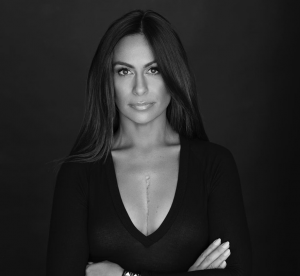Nina Stanley’s Story
If I hadn't advocated for myself and found the right doctor, I may not be here today. That does something to you mentally.
Nina Stanley
Living With A Mental Health Illness

Nina Stanley, the 46-year-old Philadelphia mother, and businesswoman had the symptoms of a heart issue, but the doctors kept pinning her health problems on stress and anxiety.
“I was misdiagnosed and disregarded by eight different cardiologists over five years, said Stanley. “After thousands  of hours of research, I diagnosed myself, found the right doctor, and was having open-heart surgery two weeks later. I was only getting 40% blood flow to my heart.”
of hours of research, I diagnosed myself, found the right doctor, and was having open-heart surgery two weeks later. I was only getting 40% blood flow to my heart.”
During the month of February, American Heart Health Month, The Quell Foundation is proud to share Nina’s important story. According to the American Heart Association, one in 10 Americans, age 18 and older, have depression. Symptoms of depression are about three times more common in patients after an acute heart attack than in the general population, which strongly suggests a link between depression and heart disease.
Researchers have also discovered that depression actually worsens the prognosis—and dramatically. Conversely, people who are diagnosed with heart disease have an increased risk of developing depression. It’s a two-way relationship. The prevalence of depression among cardiac patients ranges from 20 to 30 percent.
How have you taken care of your mental health through all of this? When you started realizing how connected your heart health and your mental health were, how did you manage the two?
My mental health took almost as much of a hit as my physical health. Cardiologists were continually telling me that it was stress, anxiety, acid reflux… regularly being dismissed. I was given prescriptions for valium and told to quit my job. That does something to you mentally.
If I hadn’t advocated for myself and found the right doctor, I may not be here today. That does something to you mentally.
Then, after my open heart surgery, I was depressed. I cried a lot. At home, at work, in inappropriate settings. Something was off. This wasn’t me. I did some research and found how common it was to be depressed after a major cardiac event, especially after being on a heart/lung machine.
It made me mad that nobody talked to me about that. I was super prepared for what my body was about to go through, but not my mind.
Beyond all the other incredible things you do, you are also a mother. What is one lesson about self-care and mental health that you would share with your children?
- Be kind to yourself.
- It’s ok to feel sad.
- Be aware of your mind as much as your body.
What resources can you direct women to if they are interested in learning more about heart health?
If you are looking for some of the top-care in the country, start by researching Cedars Sinai Women’s Heart Center and Stanford Cardiology.
Back to stories